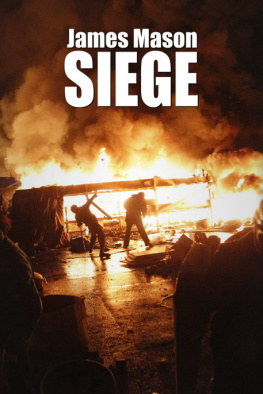Spotlight Books
Spotlight Books 2020
The moral rights of the authors have been asserted
Database right Spotlight Books.
All rights reserved. No part of this publication may be reproduced, stored in a retrieval system, or transmitted, in any form or by any means, without the prior permission in writing of Spotlight Books, or as expressly permitted by law, or under terms agreed with the appropriate reprographics rights organization. Enquiries concerning reproduction outside the scope of the above should be sent to the Rights Department, Spotlight Books, at the address above. http://www.spotlightBooks.xyz
ISBN 10: 0599911913
ISBN 13: 9780599911918
THE SIEGE OF BOSTON
BY
ALLEN FRENCH
PREFACE
In writing this book I have endeavored to produce a brief and readable account of the Siege of Boston, and of the events which brought it about. These were, of course, parts of a larger history, the connection with which I have carefully indicated. My main endeavor, nevertheless, has been to treat my subject as a single organic series of events. To select the more interesting and significant masses of detail, and properly to cordinate them, has not been an easy task. The minor incidents were conditioned by the scale of the book; the result, I hope, is fluency and a more evident connection between the larger events.
So far as possible, I have relied upon contemporary statements. But no writer on the Siege can fail to acknowledge his deep obligations to the "History of the Siege" by Richard Frothingham. This acknowledgment I gladly [Pg viii] make. Since 1849, however, the date of the publication of the book, there has come to light interesting new material which I have endeavored to incorporate here. The other authorities upon which I have chiefly depended will be found by referring to the footnotes.
ALLEN FRENCH.
CHAPTER I
BEGINNINGS AND CONDITIONS
The Siege of Boston was the culmination of a series of events which will always be of importance in the history of America. From the beginning of the reign of George the Third, the people of the English colonies in the new world found themselves at variance with their monarch, and nowhere more so than in Massachusetts. Since the New England people were fitted by their temperament and history to take the lead in the struggle, at their chief town naturally took place the more important incidents. These, which were often dramatic, had nevertheless a political cause and significance which link them in a rising series [Pg 2] that ended in a violent outbreak and the eleven months' leaguer.
As to the siege itself, it varies an old situation, for Boston was beset by its own neighbors in defence of the common rights. Previously the king's troops, though regarded as invaders, had been but half-hearted oppressors; it was the people themselves who persistently provoked difficulties. The siege proper is of striking military interest, for its hostilities begin by the repulse of an armed expedition into a community of farmers, continue with a pitched battle between regular troops and a militia, produce a general of commanding abilities, and end with a strategic move of great skill and daring. It is the first campaign of a great war, and precedes the birth of a nation. Politically, the cause of the struggle is of enduring consequence to mankind. Socially, the siege and its preliminaries bring to view people of all kinds, some weak, some base, some picturesque, some entirely admirable. The period shows the breaking up of an old society and the [Pg 3]formation of a new. A study of the siege is therefore of value.
It will be observed that the siege cannot satisfactorily be considered as a distinct series of military or semi-military events, abruptly beginning and still more abruptly ending. Such a view would reduce the siege to a mere matter of local history, having little connection with the larger movements of the American Revolution, and appearing almost as an accident which might have happened at any other centre of sufficient population. On the contrary, neither the siege nor the Revolution were accidents of history. That the Revolution was bound to come about, and that its beginnings were equally bound to be at Boston, these were conditioned in the nature, first of the colonists in general, and second of the New Englanders in particular. [Pg 4] However striking were certain of the occurrences, they were of less importance than their causes and consequences.
Accordingly I shall consider as an organic series the more important of those events which happened in Boston during the reign of George the Third, and which ended when the last of his redcoats departed from the town. In fact, in order to be perfectly intelligible I must first devote a few pages to a consideration of previous conditions.
"Any one," wrote George E. Ellis in the "Memorial History of Boston," "who attempts to trace the springs, the occasions, and the directing forces of the revolt ... cannot find his clew a year short of the date when the former self-governed Colony of Massachusetts Bay became a Royal Province." He is right in pointing out that in 1692 the struggle took open form. Yet even then the controversy was not new. In other form it had been carried on for more than half a century previous. Its ultimate origin [Pg 5] lay in the fact that the very charter under which the colony was planted differed from all other documents granted by any English king.
This difference lay in the omission of the condition, usual in such charters, that its governing board should meet in London practically for the purpose of supervision by the king. That the omission of this condition was the result of wisdom on the part of the founders, and stupidity on the part of the officers of the king, seems undeniable. The founders, unhappy and alarmed at the political and religious situation in England under Charles the First, were seeking to provide for themselves and their families a refuge from his oppressions. Secure in their charter, they presently left England for good. When they sailed for America they did all that could be done to cut themselves off from interference by the crown.
At intervals, extremely valuable for the future of America, the Massachusetts colony certainly was free of all restraint. Charles's [Pg 6] benediction seems to have been "Good riddance!" From the crown the colonists received no assistance whatever, and it was long both their boast and their plea that they had planted the colony "at their own expense." They were left to work out their own salvation. As a result, their passionate desire for freedom from interference by the king grew into the feeling that they had earned it as a right. Englishmen they were still, and subjects of the king; but to the privileges of Englishmen they had added the right to manage their own affairs. The English king and the English law were to help them in their difficulties and to settle cases of appeal. In return they would grant money and fight for the king when necessary; but in the meantime they would live by themselves.
Taking advantage of the clause in their charter which authorized them "to ordain and establish all manner of wholesome and [Pg 7] reasonable orders, laws, statutes, and ordinances," they speedily took to themselves everything but the name of independence. They instituted courts for all purposes, set up their legislative government, raised their own taxes, whether general or local, and perfected that wonderful instrument of resistance to oppression, New England town government. They even coined money. And, different from most of the other colonies, they chose their governor from among their own number.













